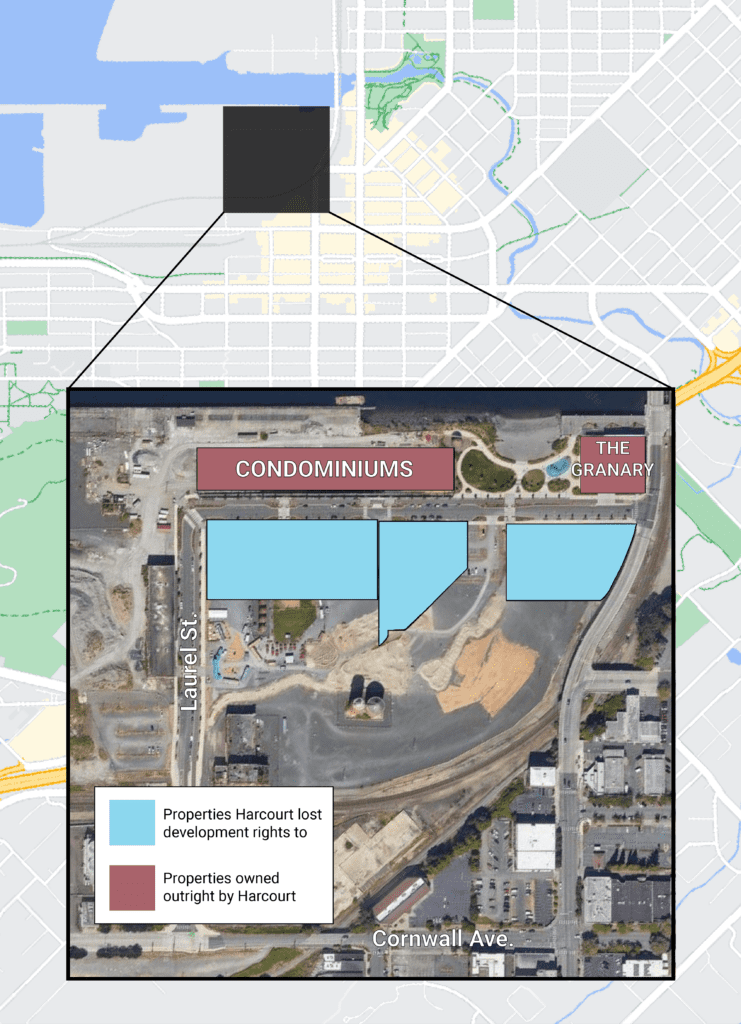Harcourt was granted on Friday, May 10 an extension of a temporary restraining order against the Port of Bellingham in Whatcom County Superior Court.
The hearing, meant to consolidate the two lawsuits Harcourt Developments and the port have launched at one another, as well as reviewing if Harcourt will continue to be able to access an area on port property, lasted nearly 40 minutes. The cases were consolidated in front of Whatcom Superior Court Judge Robert Olson for judgment.
The port argued the Ireland-based company shouldn’t be granted the restraining order because it has dragged out a major waterfront property development project. Olson questioned if Harcourt was asking for the appropriate action in the right venue.
What started out in 2015 as a rosy relationship between Harcourt and the port to develop 18.8 acres of waterfront property, including the Granary Building, began to sour in 2021 as Harcourt missed key milestones in the contract, resulting in the port reducing the development area. Further reductions to the area came in October 2023 when Harcourt was unable to finish two out of three condominium buildings.
The port sued Harcourt in March alleging the development company had defaulted on its contract, and requested a Whatcom County Superior Court judge rule on whether the port had the right to refuse Harcourt’s request for an extension on the Master Development Schedule.
Weeks later in April, Harcourt returned the favor, filing a restraining order against the port, alleging it had attempted to interfere with the condominium construction project by threatening to call the Bellingham Police Department to report Harcourt was trespassing on port property.
The trespassing allegation was based on Harcourt using the property to stockpile materials in an area where a construction license agreement between the two parties had lapsed in 2022.

“As it stands, there has been no meeting of the minds on a new construction license, despite the port’s attempt to work with Harcourt to come to an agreement,” port attorney Todd Egland said in court on Friday. He requested the motion for the restraining order’s extension be denied.
Egland said the material on the port’s land, behind the Boardmill building, was contaminated soil excavated from Harcourt’s building project, and that according to Department of Ecology rules, material can’t be stockpiled for more than two years.
“Rather than remove the offending materials as agreed to and as required, Harcourt insists the court must extend the expired construction license indefinitely until the parties complete mediation and, or, arbitration,” Egland said. “This puts the port at risk and would force the port to expend unnecessary taxpayer dollars to remove the material itself.”
Richard Skalbania, an attorney for Harcourt, argued that it had the right to arbitration and to access to the area in the construction license.
Harcourt has sunk $40 million into the waterfront condominium project, leading Olson to question if the developer was asking for the correct damages.
“Millions of dollars have been invested into this. Why is that not the basis for the lawsuit?” he said. “I will say this, I’m not trying to spend Port Commission money — the port has some deep pockets — but it seems to me that’s the remedy that Harcourt would be seeking.”
Skalbania doubled down that Harcourt believed arbitration was the fundamental issue. The arbitrator would then be able to decide what the damages are.
While Olson granted an extension of the restraining order until June 14, he was wary of his decision.
“My inclination is to deny the motion right now as I sit here,” he said, noting he understood the waterfront development project was complicated. “All I’m thinking in the back of my mind is just the cash register sound going off about how expensive it might be if in fact the port is liable for breach of contract.”
Annie Todd is CDN’s criminal justice/enterprise reporter; reach her at annietodd@cascadiadaily.com; 360-922-3090 ext. 130.




